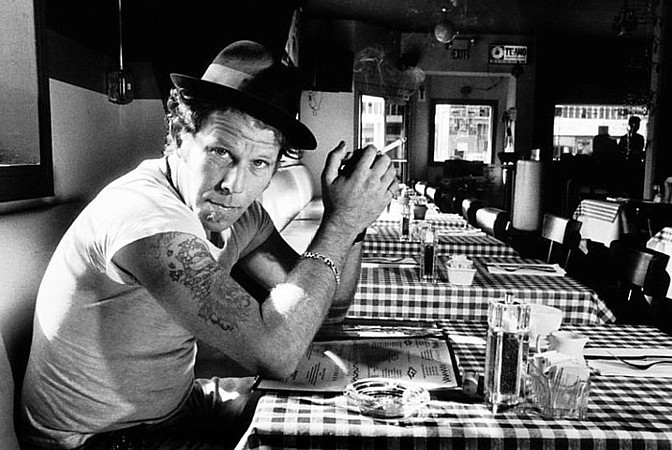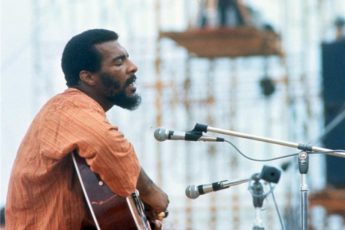Until now I would have believed an old friend/neighbor of mine Dave (RIP) to have been the biggest fan of Tom Waits I’ve known; he and his wife Kay named their son Waits in his honor.
I’ve always considered myself a Tom Waits admirer, while still remaining relatively unexposed to the breadth of his difficult-to-categorize five-decade career. However much one may know about Tom Waits, though, it seems fair to agree that he probably has the most unique voice in the history of popular music. But, as lovingly described here in intricate detail in a write-up by my friend Petey, Waits’ metaphorical “voice” has been no less distinctive.
Here then is another SMGM guest post, a look at the eminently colorful career of Tom Waits, peppered with plenty of other tangential musical references, by NYU professor, founder of ClusterFest Events and general life-of-the-party good guy, Peter Rosenberger. Take it away, Petey.
* * * * *
It was back in 1976, on the tranquil shores of Lake Ronkonkoma on Long Island, New York that I first heard and developed an immediate fascination with Tom Waits, then an up-and-coming alternative artist who has effectively paved his own lane in music history the last half century. In 2011, Waits was inducted into the Rock & Roll Hall of Fame with fellow artists Darlene Love, Alice Cooper, Neil Diamond, and Dr. John. In addition to his roughly 25 original albums Tom can also be seen in 30+ feature films, and may I suggest Down By Law (1986) with John Lurie and Roberto Benigni as a must-see.
So, who is this scruffy, alternatively and unquestionably talented, uniquely creative storyteller and balladeer? Our unkempt genius was born in Pomona, CA. in east L.A. County in 1949 and broke onto the music scene with the 1973 release of his debut album, Closing Time.
Fortunately, and in hindsight, I was lucky to have been exposed to TW just three years later in 1976. We were a bunch of high school kids, drinking beer in someone’s parent’s car at around midnight on a fall Friday night. What I recall hearing were some sort of awkward (to be generous) chords and a flirtatious off-key conversation with an inebriated instrument. It felt like this Tom guy was trying to take the car keys away from a friend that should not have been driving home that night (oh crap, was that us?). Then, the lyrics slowly came into focus for me: “Cause the bouncer is a Sumo wrestler, cream-puff casper milquetoast. And the owner is a mental midget with the I.Q. of a fencepost. Cause the piano has been drinking, the piano has been drinking…” And continuing…
“…and you can’t find your waitress
with a Geiger counter
and she hates you and your friends
and you just can’t get served without her
and the box-office is drooling
and the bar stools are on fire
and the newspapers were fooling
and the ashtrays have retired
and the piano has been drinking
the piano has been drinking
the piano has been drinking
not me, not me, not me, not me, not me…”
My musical interests had started years earlier, listening to everything from The Beatles and Dave Clark Five to Led Zeppelin or the Jackson 5 and Jackson Browne, Jim Croce, Bonnie Raitt and the wonderful sexiness of Linda Ronstadt. Who does not love the lovely Linda? The 60’s and 70’s were two decades of enormous transition in what we have come to know as Popular Music. And the Disco craze usurped the second half of the 70’s, transforming the Bee Gees from classic, time-honored hits like ‘I Started a Joke,’ ‘Words’ and ‘How Can You Mend a Broken Heart’ to ‘Night Fever’ and ‘Stayin’ Alive,’ an incredible evolution to put it in plain English. But Let’s Get Back to where we’re going to.
In this context, where the hell does our man Tom Waits fit in? Well, after getting home safely from our lakeside beer intake, I went on a mission to seek out and consume more of this then-young man, who’d already seemingly smoked more cigarettes and sipped on more cocktails than anyone I knew had a right to so early in life. He was 20-something, cool, unpretentious, and quite weird – everything I wanted and still hope to be in this life, despite the runway becoming ever shorter for me “These Days” (a Jackson Browne classic from his For Everyman album).
You be the judge; we can agree that Tom Waits is not everyone’s cup of tea (or glass of Scotch & Soda), but his musical prowess, acting chops, and ongoing exploration and exploitation of norms makes him a force to be reckoned with in musical history. How can one guy, one offbeat, wildly imaginative, standard-shattering, and most quotable beatnik create, well, So Much Great Music? Let’s take a look.
These first few examples shine a light on the Mellon Collie and seemingly infinite sadness of TW’s storytelling; lyrically, musically, and emotionally. One might say that Tom Waits lives at the crossroads of great melodies and obscure lyrics (I sure would). Here are a sampling of some abiding classics from Tom’s catalogue (in chronological order):
- ‘I Hope That I Don’t Fall in Love with You’ (Closing Time – 1973)
An ode to love at first sight, and possibly through the original set of beer goggles. I’ll have another Stout!
- ‘Martha’ (Closing Time – 1973)
Love, pining, and reminiscing, long before Little River Band.
- ‘Foreign Affair’ (Foreign Affairs – 1977)
Documenting a most memorable one-night stand, in a place far from home.
- ‘Christmas Card from a Hooker in Minneapolis’ (Blue Valentine – 1978)
Empathy is a powerful thing.
- ‘Soldier’s Things’ (Swordfishtrombones – 1983)
A yard sale pitch for the deeply personal items of a fallen hero. Everything’s a dollar in this box.
- ‘Time’ (Rain Dogs – 1985)
Timeless.
Next, a Waits Words Top 11 – of some sort (it’s so hard to create a definitive list). Let’s call these the ones that can be listened to again and again and you will likely glean something new from them every time.
- Two cover songs: Big Joe and Phantom 309 (written by Red Sovine), an absolute classic from Nighthawks at the Diner, plus the much more familiar version of Tom’s Jersey Girl as covered by The Boss. This might also be a great jumping-off point on the Downtown Train for the best of Waits’ work as covered by other artists (Holly Cole immediately comes to mind). Let’s save that report for a rainy day.
10a. INTRO to Eggs & Sausage
“I’ve had strange looking Patty Melts at Norm’s…. I’ve had dangerous Veal Cutlets at the Copper Penny… topped with a provocative sauce of Velveeta and Half & Half, uhuhuhuh, smothered with Campbell’s Tomato Soup… I ordered my Veal Cutlet. Christ, it left the plate, and walked down to the end of the counter… the Veal Cutlet come down tried to beat the shit out of my cup of coffee. Coffee wasn’t strong enough to defend itself… uhuhuhuh.”
10b. Eggs & Sausage (in a Cadillac with Susan Michelson)
“Now, the classified section offers no direction
It’s a cold caffeine in a nicotine cloud
Now the touch of your fingers lingers burning in my memory
I’ve been eighty-sixed from your scheme
Now I’m in a melodramatic nocturnal scene
Now I’m a refugee from a disconcerted affair
Now the lead pipe morning falls, now the waitress calls… Eggs & Sausage, side of toast.”
- I Never Talk to Strangers (Duet w/ Bette Midler)
HER: Your life’s a dime-store novel. This town is full of guys like you. And you’re looking for someone to take the place of her.
HIM: You must be reading my mail, you’re bitter cause he left you. That’s why you’re drinking in this bar…
BOTH: Well only suckers fall in love with perfect strangers…
- (Looking for) The Heart of Saturday Night
“Then you comb your hair, you shave your face
Trying to wipe out every trace
Of all the other days in the week
You know that this’ll be the Saturday you’re reaching your peak”
- Frank’s Wild Years (from the Late Show with David Letterman)
- Nobody
“You’ve had many lovers
You’ll have many others
But they’ll only just break your poor heart in two
Nobody, nobody
Will love you the way that I could
Cause nobody, nobody’s that strong
Cause nobody is that strong”
- Better Off Without a Wife — for all the bachelors out there
“All my friends are married
Every Tom and Dick and Harry
You must be strong if you’re to go it alone
Here’s to the bachelors and the Bowery bums
Those who feel that they’re the ones
That are better off without a wife
Cause I like to sleep until the crack of noon
Midnight howling at the moon
Going out when I want to,
And I’m coming home when I please
Don’t have to ask permission
If I wanna go out fishing
Never have to ask for the keys”
- What’s He Building?
“He has no friends
But he gets a lot of mail
I’ll bet he spent a little time in jail
I heard he was up on the roof last night
Signaling with a flashlight
And what’s that tune he’s always whistling
What’s he building in there?
What’s he building in there?
We have a right to know”
- The Piano Has Been Drinking (from Fernwood Tonight, 1977)
- On the Nickel
“Sticks and stones will break my bones I always will be true
and when your mama’s dead and gone I’ll sing this lullaby just for you
and what becomes of all the little boys who never comb their hair
they’re lined up all around the block on the nickel over there
so better bring a bucket there’s a hole in the pail
and if you don’t get my letter then you’ll know that I’m in jail
and what becomes of all the little boys who never say their prayers
they’re sleepin’ like a baby on the nickel over there”
- Take it With Me
“In a land there’s a town
And in that town, there’s a house
And in that house, there’s a woman
And in that woman there’s a heart that I love
I’m gonna take it with me when I go
I’m gonna take it with me when I go”
Finally, Tom Waits and David Letterman have had a unique and reciprocal relationship, with genuine admiration in both directions, for several decades. Here is the poignant song Tom wrote for Dave when he retired from The Late Show in 2015, Take One Last Look.
There is ample opportunity to discuss and debate the merits of any given Tom Waits creation, performance, instrumentation, arrangement, vocal characteristic, lyric, etc. As it should be. Creativity so freely flows from his curious mind – and for half a century now – that one has to wonder how much of this he has actually experienced and what crazy tales has he brought to us directly from his seemingly infinite imagination. Blurred Lines, long before Robin Thicke was a thing. One might argue that in his extraordinary lifetime, Tom plays for no one, Tom writes for no one, and Tom Waits for No One. “I don’t think that you should be perfectly candid and frank about the intimate details of your personal life with the public at large,” Waits once said. “Subsequently, it creates considerable personal problems.”







Rob MacMahon
June 28, 2023 2:51 pmBG: Here’s another one we hv to agree to disagree on…This cat’s phony-baloney boho hobo routine is tired and just plain cheesy. No thanks. But keep ’em comin’, my friend. Music is life. RMac